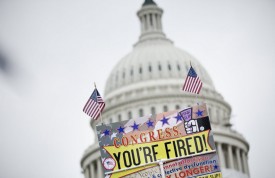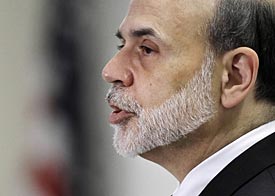Nov. 16, 2010 at 6:07 p.m.
Filed under:
Economy,
Policy,
Politics
By Dow Jones Newswires
Federal Reserve officials, taken aback by stinging criticism of their decision to print money and buy $600 billion in Treasury bonds, are counterpunching to defend themselves and, in some cases, to reinforce their commitment to the policy.
Charles Evans, president of the Federal Reserve Bank of Chicago and a strong supporter of the Fed’s easing policy, noted in an interview with The Wall Street Journal that the weak economy and low inflation warrants the Fed’s policy and that more such purchases might be needed in the months ahead if the economic outlook doesn’t turn.
“I would continue to want to apply accommodative monetary policy until I had some confidence that that situation was changing,” Evans said, noting that $600 billion is a “good place to start” the easing program. Get the full story »
Nov. 10, 2010 at 2:57 p.m.
Filed under:
Mortgages,
Policy,
Politics
By Associated Press
The Federal Reserve says it will buy a total of $105 billion worth of government bonds starting later this week as it launches a new program to invigorate the economy. Get the full story »
Nov. 8, 2010 at 3:31 p.m.
Filed under:
Policy,
Politics
By Associated Press

Fed governor Kevin Warsh, right, with Fed Chairman Ben Bernanke on Aug. 27, 2010. Warsh expressed doubts on Monday about the Fed's $600 billion bond-buying plan. (AP Photo/Reed Saxon)
A Federal Reserve official with a close working relationship with Chairman Ben Bernanke is expressing skepticism over the Fed’s new $600 billion program to bolster the economy.
Kevin Warsh, a Fed governor, warns that there are “significant risks” associated with the Fed’s bond-buying program, including the potential for triggering inflation.
The Fed’s program, announced last week, is aimed getting Americans to spend more and invigorate the economy by making loans cheaper. But Warsh doubts the program will have “significant” or “durable benefits” for the economy. Despite his reservations, Warsh voted for the program. Get the full story »
Nov. 5, 2010 at 3:22 p.m.
Filed under:
Banking,
Economy
By Reuters
Federal Reserve Chairman Ben Bernanke on Friday defended the U.S. central bank’s bond-buying against beggar-thy-neighbor criticism, saying it was “critical” for global stability that the U.S. economy regain its strength.
Doing so, he suggested, would bolster a dollar whose weakness has sparked cries of foul from Bogota to Beijing.
The U.S. central bank’s decision to buy $600 billion of government debt has drawn scathing comments from a host of nations who contend it is generating global instability by ramping up their currencies against the dollar, inflating asset bubbles and stoking inflation in their economies. Get the full story »
Nov. 4, 2010 at 5:11 p.m.
Filed under:
Banking
By Reuters
The Federal Reserve is expected soon to allow some healthy banks with strong capital levels to increase dividend payments, according to people familiar with the decision.
The updated guidance from the Fed is likely a few weeks away. The Fed is expected to take a conservative approach in deciding which banks can increase dividends and assess each bank individually, according to a person familiar with the matter. Get the full story »
Nov. 2, 2010 at 11:08 a.m.
Filed under:
Economy,
Policy,
Politics
By Reuters
The U.S. Federal Reserve opens a two-day meeting on Tuesday that is expected to conclude with a decision to pump hundreds of billions of dollars into the economy to stir the tepid recovery out of its doldrums. Get the full story »
Nov. 1, 2010 at 3:33 p.m.
Filed under:
Economy,
Policy,
Politics,
Small business
By Reuters
Small U.S. businesses stepped up borrowing in September, data released by PayNet Inc on Monday showed, suggesting the recovery is gaining steam even before the Federal Reserve Bank embarks on an expected new round of monetary stimulus.
The Thomson Reuters/PayNet Small Business Lending Index, which measures the overall volume of financing to U.S. small businesses, rose 16 percent in September from a year earlier, PayNet said. The index rose 15 percent in August, and is now at the highest level in almost two years. Get the full story »
Oct. 28, 2010 at 1:59 p.m.
Filed under:
Policy,
Politics
By Reuters

A sign at a Tea Party rally in September. (Brendan Smialowski/Getty Images)
The popularity of Tea Party candidates in U.S. elections could spell renewed efforts to curtail the power and independence of the Federal Reserve, which has been cast as an emblem of big government overreach.
Outsider candidates thriving on the right flank of the Republican Party have tapped anger at bank bailouts, soaring budget deficits and President Barack Obama’s health care and regulatory initiatives to topple establishment GOP politicians in elections around the country.
Tea Party members have lambasted the Fed for its unprecedented and aggressive steps to bolster the economy in the wake of the 2007-2009 financial crisis, saying the moves have exposed a lack of accountability at the Fed and raise the risk of damaging inflation down the road. Get the full story »
Oct. 28, 2010 at 5:41 a.m.
Filed under:
Economy
By Reuters
Most leading economists expect the Federal Reserve to buy between $80 billion and $100 billion worth of assets per month under a new program to bolster the struggling economy, a Reuters poll found on Wednesday.
Estimates for how long the Fed will print money and how much it will eventually spend varied widely, from $250 billion to as high as $2 trillion.
In a similar Reuters poll of primary dealers conducted on October 8, dealers mostly forecast the total size of the new program at $500 billion to $1.5 trillion. Get the full story »
Oct. 25, 2010 at 10:23 a.m.
Filed under:
Banking,
Economy,
Policy,
Updated
By Gail MarksJarvis
Federal Reserve Chairman Ben Bernanke, in a speech on foreclosures and housing finance, said he expects a broad federal banking and housing agency investigation into alleged improper foreclosures to conclude next month. And he lauded the Chicago Federal Reserve for its analysis of foreclosure problems at the community level.
Oct. 22, 2010 at 5:31 p.m.
Filed under:
Exchanges,
Investing,
Technology
By Reuters
U.S. stocks could see big swings to the downside next week on any remotely “bad” news since volatility indexes are at levels considered too low.
The Chicago Board of Options Exchange Volatility Index, a gauge widely used to measure investors’ anxiety levels, fell 2.54 percent on Friday to close at 18.78, its lowest level since April. The VIX, which rose to near 50 in May, has been around or under 20 for the past two weeks. Investors also will face a blizzard of earnings, which many analysts believe will continue to support the rally that began early this month. But any disappointments in either earnings or outlooks could, of course, trigger a sharp sell-off. Get the full story »
Oct. 19, 2010 at 5:46 p.m.
Filed under:
Economy,
Jobs/employment,
Policy,
Politics
By Reuters
A string of Federal Reserve officials on Tuesday indicated the central bank will soon offer further monetary stimulus to the economy, with one saying $100 billion a month in bond buys may be appropriate. Get the full story »
Oct. 19, 2010 at 9:58 a.m.
Filed under:
Economy,
Jobs/employment,
Policy,
Politics
By Reuters
The U.S. Federal Reserve should pump more cash into the economy and temporarily stoke inflation to counter the stifling effects of high unemployment and undesirably low inflation, a top Fed official said on Tuesday.
“For many, my proposal will be a hard pill to swallow,” Chicago Fed President Charles Evans told a group of business leaders in Evanston. Get the full story »
Oct. 15, 2010 at 9:40 a.m.
Filed under:
Economy,
Government
By Tribune newspapers

Fed Chairman Ben Bernanke. (AP)
Federal Reserve Chairman Ben S. Bernanke on Friday laid out a case for the central bank to take further action to bolster growth, citing the risks of prolonged high unemployment and a U.S. economy slipping into a deflationary spiral.
In a much-anticipated speech in Boston, Bernanke did not spell out details of how and when the Fed would take action. But the first option that he mentioned was a program of buying additional assets, namely government bonds, in an effort to drive down long-term interest rates and stimulate economic growth.
The central bank is widely expected to announce such a program, known as quantitative easing, at its next policymakers’ meeting on Nov. 2 and 3. Get the full story »
Oct. 12, 2010 at 1:14 p.m.
Filed under:
Economy,
Government
By Associated Press
A new program to pump up the U.S. economy through the purchase of government debt dominated Federal Reserve officials’ discussions at their September meeting.
Minutes of the closed-door deliberations, released Tuesday, suggest Federal Reserve Chairman Ben Bernanke and his colleagues were closing in on a consensus to launch such a program. Get the full story »







